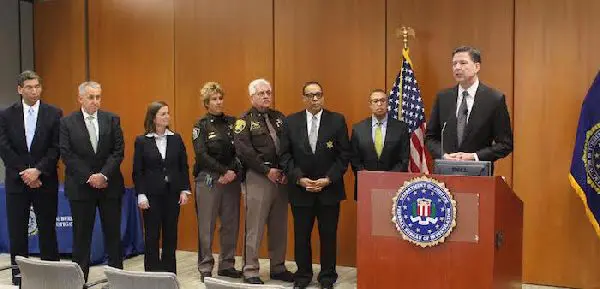
DETROIT – During
a visit to Detroit, FBI Director James Comey said that the rise of Islamophobia
has been a concerning issue to the government agency.
“It worries me,”
Comey said. “What we tell folks is that if you think something is going on,
then tell us. It’s a huge part of our responsibility that we take very
seriously–to make sure people aren’t picked on, bullied, harmed, scared or
intimidated by virtue of the way they look, where they worship, or how they act.”
This marks
Comey’s second visit as the FBI Director to Detroit. He visited the city in
April 2014 as part of his efforts to frequent all 56 FBI regional offices.
Comey has seven years remaining in his tenure as the FBI Director.
His latest visit
to the motor city was led by a busy itinerary that included meeting with
community leaders on Tuesday morning. Among them were Osama Siblani, publisher of The Arab American News; Ali Jawed, founder of the LAHC; Chaldean leader Nabby Yono; Sueheila Amen and Dr. Hoda Amine.
Comey addressed numerous questions from the community leaders during the brief gathering. He said Congress is pressuring him to personally guarantee background checks on refugees who are settling in the U.S., an obstacle that he said was difficult.
Siblani raised concerns about local residents being wrongfully placed on terrorist watch lists and having little to no avenues in getting their names removed. Come said he would look into the issue with Homeland Security to find a resolution.
Comey noted that
the FBI force lacks diversity, and that one of his priorities for the remainder
of his tenure will be to hire minorities to work for the Bureau, in order to
accurately reflect the country’s population. He said currently, the FBI’s force is 83 percent White.
During a press
conference at the FBI Detroit Field Office on Tuesday afternoon, leaders that
included U.S. District Attorney Barbra
McQuade, Detroit Police Chief James Craig, Wayne County Sheriff Benny Napoleon
and FBI Special Agent in Charge of Detroit Division David P. Gelios, were in
attendance to signify a unified front between the FBI and local law
enforcement.
Comey said he
was astonished at the level of communication that has formed between the
community and local law enforcement officials.
He added that
the relationship is a model that needs to be implemented in other regions.
“Their
overwhelming message to me actually surprised me,” Comey said of the local
leaders he had met earlier in the day. “They said ‘we believe that this area is
a model for cooperation across a variety of relationships that are troubled
elsewhere in the country.’ One of my hopes is that I can steal whatever that
magic potion is that we’ve spread on all these good folks and in law
enforcement, and sprinkle it other places across the country.”
Comey said the
FBI’s top objective is to combat counter-terrorism, specifically relating to
ISIS attempting to recruit lone Americans.
The FBI said
there are various methods in ISIS’ attempt to appeal to troubled individuals.
The first involves swaying them to leave the country.
“They come at us
through social media in an effort to recruit Americans,” Comey said. “To travel
to their so called caliphate to live a life off glory and participate in the
final battle between good and evil on god’s side…it resonates with troubled
souls in the United States. It has over the last couple of years.”
Comey said
another element of ISIS’ operation involves encouraging Americans to carry out
deadly attacks in the U.S.
He said this
method is also primarily orchestrated through social media–mostly on Twitter.
“It’s the reason
we have investigations all over the country,” Comey said. “We try to understand where people are on the
path from consuming to acting. That is a very difficult thing for us to try and
decipher.”
Comey said the
FBI is constantly depending on local and state authorities to help them
identify and servile suspected individuals.
“It requires us
to conduct surveillance of someone, to understand where they are going,” Comey
said. “With the help of our state, local
and federal partners, we try to keep track of people who may be headed towards
a violent destination.”
The FBI Blitz
comes 24 hours after the Michigan Chapter of the Council on American-Islamic
Relations (CAIR-MI) announced a lawsuit, challenging the FBI’s ‘terrorist watch
list.’
CAIR-MI filed
the suit on behalf of 18 American Muslims, including a four-year-old child, who
were allegedly placed on the list without reason or notice.
Comey briefly
addressed the lawsuit, stating that it wouldn’t make sense to inform suspected
individuals who are being monitored.
“It’s hard to
see how that would work operationally,” Comey said. “Even the biggest critics
of our watch list would surely agree that there are some people out there who
are really of concern to all of us. So how would it work if we would notify
them that ‘we might know you are bad?’”
He added that
there should be a system in place that would assist wrongfully suspected
individuals in challenging their name being on the list.
“I think the
best way for all of us is to find procedures that if someone believes they are
being encountered in a way that doesn’t make sense, that they’d have the
opportunity to raise that,” Comey said.
Comey said the
FBI depends on community members—law enforcement officials, educators, and
religious leaders, in helping them identify people who have been radicalized.
“We think our
part is to build relationships so we are able to share information,” Comey
said. “Having a good enough relationship so that people who don’t want to see
violence–alert us when they see something that is concerning.”






Leave a Reply